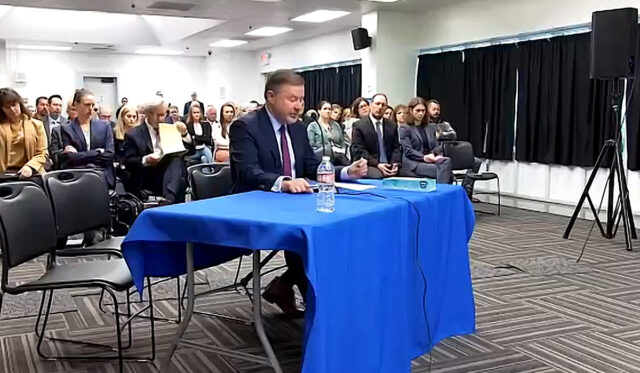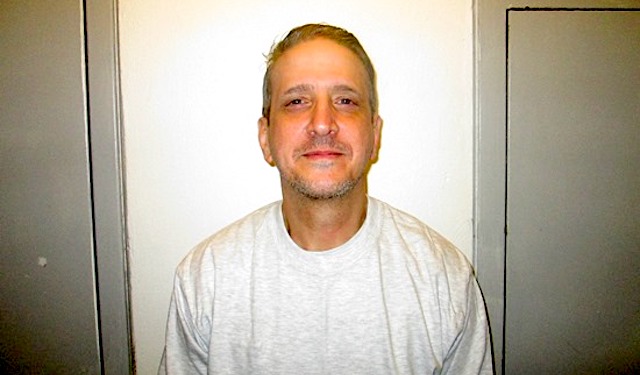

(Correction: This article was updated at 2:03 p.m. Wednesday, April 26, to correct reference to the legal process governing the Richard Glossip clemency application. It was updated again at 5:30 p.m. to reference Richard Smothermon’s recusal.)
After hearing from Oklahoma Attorney General Gentner Drummond and an array of speakers who questioned the quality of the trials that convicted Richard Glossip of first-degree murder, the Oklahoma Pardon and Parole Board did not recommend clemency today for the death-row inmate during a meeting held at the Ted Logan Center in Oklahoma City.
Only four members of the five-member board were present Wednesday, and a motion to recommend clemency failed 2-2. A majority was needed to recommend clemency and a sentence change to life without the possibility of parole. Board members Edward Konieczny and Calvin Prince voted to recommend clemency, which Richard Miller and Cathy Stoker voted against it. Former district attorney Richard Smothermon was absent from Wednesday’s board meeting after recusing from the case owing to a family member’s involvement in Glossip’s second prosecution.
Glossip, 60, faces a May 18 execution date after being on death row for 25 years. In 1997, he was initially charged with accessory to murder following the killing of Barry Van Treese, who was Glossip’s boss at the time. Justin Sneed, one of Glossip’s coworkers, later confessed to beating Van Treese to death and received a sentence of life without the possibility of parole.
Glossip was eventually charged with first-degree murder and sentenced to death in 1998. Sneed avoided the death penalty by testifying that Glossip had hired him to kill Van Treese.
The Oklahoma Court of Criminal Appeals later overturned Glossip’s original conviction for ineffective assistance of counsel, but Glossip was convicted and sentenced to death again at a 2004 retrial.
Drummond intervenes in Glossip case
In March, Drummond announced his office would seek a stay in Glossip’s execution until 2024 to allow for an independent counsel to review Glossip’s case. That review questioned Glossip’s defense and alleged that prosecutors withheld evidence about Sneed’s mental health during Glossip’s trial. Drummond asked the Court of Criminal Appeals to vacate Glossip’s conviction and trigger a new trial, but the appellate court denied his request.
With his filings and comments, Drummond has stopped short of proclaiming Glossip’s innocence, but he said there was enough doubt of his guilt to make the death penalty inappropriate.
In his clemency petition, Glossip’s attorneys said his wrongful conviction “is the product of an inexcusably negligent police investigation, coercive and unreliable interrogation techniques, intentional destruction by the state of key physical evidence prior to the trial, prosecutors’ presentation of unvetted, unreliable evidence, and incompetent state-provided defense attorneys, among other breakdowns of the justice system.”
Drummond told the board Wednesday that he believes Glossip is guilty of being an accessory to murder after the fact, and may very well have murdered Van Treese, but the quality of the 2004 trial and questions that have arisen since then make the death penalty excessive.
“My position from the beginning is that I’m troubled by this issue, but I would confirm that I believe Mr. Glossip is, in fact, guilty of at least accessory after the fact,” Drummond told the board. “More likely than not, he’s guilty of murder. But I don’t believe that the evidence presents he is guilty beyond a reasonable doubt, and that is my concern. I believe that when we view the cumulative nature of the facts, I have reached the difficult decision that the state cannot proceed in confidence with the conviction that would result in the death penalty.
“I believe this board should support a recommendation of clemency based on the complete record that includes evidence the jury did not hear. I believe it is a great injustice to allow the execution of a man whose trial was plagued by many errors.”
Richard Glossip speaks to Pardon and Parole Board

Emphasizing his claim of innocence, Glossip made his case for clemency to the board for about four minutes via video stream.
“I must say again in this hearing that I did not know about Justin Sneed’s plan to commit any crime against Barry Van Treese, and I would have never thought of paying anybody to commit a crime,” Glossip told the board. “I absolutely did not cause Justin Sneed to commit any crime against Mr. Van Treese, let alone to murder him. I know that in the chaos of Mr. Van Treese’s death, I made mistakes in how I responded. I am deeply sorry if I caused anyone any further harm.”
Glossip concluded his remarks by thanking his wife, Lea.
“Finally, I am grateful to my wife Lea who has stood by my side in all the tough times we have faced never wavering in our faith and commitment to each other and for keeping me strong every step of the way,” Glossip said. “I am not a murder, and I do not deserve to die for this.”
Attorney Reed Smith, who has reviewed the case on behalf of Glossip, told the board Glossip overcame difficulties in life to become a manager of Dominos Pizza and later a manager at budget motels.
“Rich was happy with his situation with working with Barry Van Treese in 1997. At that time he had a roof over his head and enough money to buy the small things that made his life worth living,” Smith said. “It may not seem like much, but for a guy with a 7th-grade education and all those siblings who were having so many problems, he was doing pretty good. The idea that he wanted to take over the Best Budget Inn for himself came only from Justin Sneed, a man that now everyone, including the state, admits is a liar.”
Smith said Glossip’s life had been crime-free up until he was put on trial in connection with Van Treese’s death.
“At the time of this incident, Rich Glossip was 34 years old. All of us here in the criminal justice system know that people rarely begin a life of crime at 34,” Smith said. “Most true criminals start young and begin to amass a criminal record as a juvenile. Justin Sneed is a good example of this. He was only 19 when he murdered Barry Van Treese, and he had already been in trouble for things like burglary, making a bomb threat at his school, and threatening to kill his middle school teacher. The worst thing on Rich Glossip’s record was a traffic ticket.”
Van Treese widow argues against clemency
Donna Van Treese, who had been married to Barry Van Treese for 18 years at the time of his murder, told the board that the loss of her husband has devastated the family.
“That’s the date my entire world shattered,” Donna Van Treese said. “I was only 38 years old at the time, and I had five children at home. Barry had two children from a previous marriage. Barry also had four grandchildren at the time of his death. Now we have 13 grandchildren and three great-grandchildren that have missed his love and devotion and the silly songs he sang to all of us. Family was greatly important to Barry, and we have missed his presence in all of our lives.”
Donna Van Treese concluded by saying she hoped justice is carried out. For her, that would mean Glossip is executed for his crime.
“Our hope is that justice will be served for our beloved Barry and that you will take into consideration our statements,” she said.
Glossip’s wife, an anti-death penalty advocate whose maiden name was Lea Rodger, said her day-to-day life with Glossip includes eating dinner over the phone together each night and attending virtual church services each Sunday. The pair were married in 2022, and she is a student at Oklahoma City University’s law school. (Glossip was previously married to Leigha Joy Jurasik, a New Jersey woman who was 21 years old at the time of their 2018 marriage. In granting their divorce, a judge ordered Jurasik to pay Glossip $8,500 to cover alimony and attorney fees.)
“The love we have and our shared faith is what has gotten us through the rough times we have faced,” Leah Glossip told the Pardon and Parole Board on Wednesday. “It is impossible for anyone including myself to fathom what Richard has lost which is 26 years of his life along with everyone he knew. This ordeal has been psychologically terrorizing.”
Glossip faces May 18 execution
Glossip has been scheduled for execution three times in the past. He was scheduled to be executed in 2015, but the state halted its executions for nearly seven years because of problems with obtaining drugs to carry out lethal injections.
Since resuming executions in 2021, the state of Oklahoma has put eight people to death under the Stitt administration. In November 2021, however, Stitt commuted the death sentence of convicted murdered Julius Jones to life without the possibility of parole. Like Glossip, a major campaign proclaiming innocence for Jones drew national attention. But Jones’ sentence was recommended for commutation, a requirement in the Oklahoma Constitution for the governor to change a death-penalty sentence.
Stitt does have the power to grant 60-day stays of executions, something he has done before in Glossip’s case.
On Aug. 16, 2022, Oklahoma Gov. Kevin Stitt granted a stay of execution to Glossip, who was then scheduled to be executed on Dec. 8. In November 2022, Stitt granted another stay of execution to address Glossip’s pending legal proceedings. He was rescheduled for Feb. 16, 2023. On Jan. 24, 2023, Glossip’s execution was rescheduled to May 18, 2023, owing to Drummond’s pending third-party review of the case.
Glossip’s clemency effort was also supported by 62 Oklahoma legislators, including 45 Republicans. One of them, Rep. Justin Humphrey (R-Lane), told the board if the state is going to execute someone, there should be no questions about their actual guilt.
“I have taken an oath to carry out justice,” Humphrey said. “This is an oath that is extremely important. I made that oath to God and the people of Oklahoma. And I’m here to carry out that oath. When I was first contacted to look at this case, I was extremely reluctant. I explained there were so many systems and so many opportunities this person has had that there is no way something like this could slip through the cracks. But as I began to look into this case it wasn’t the evidence that surprised me but rather the lack of evidence.”




















